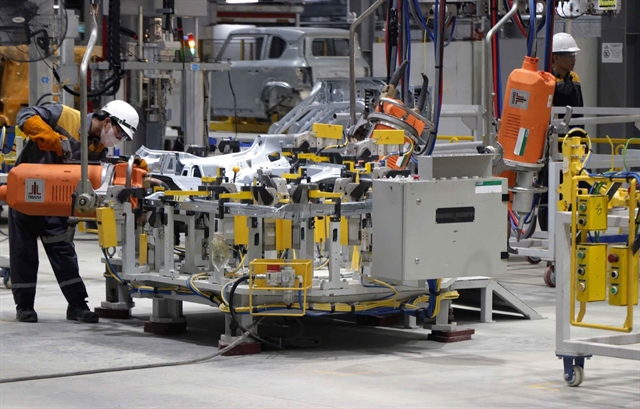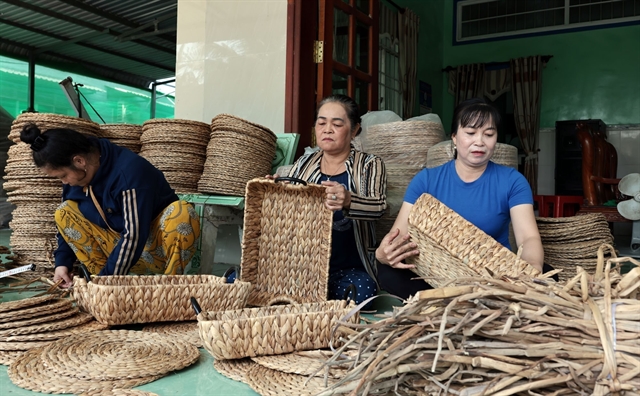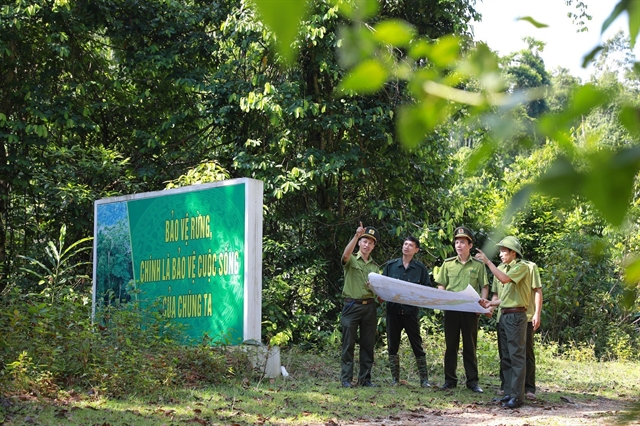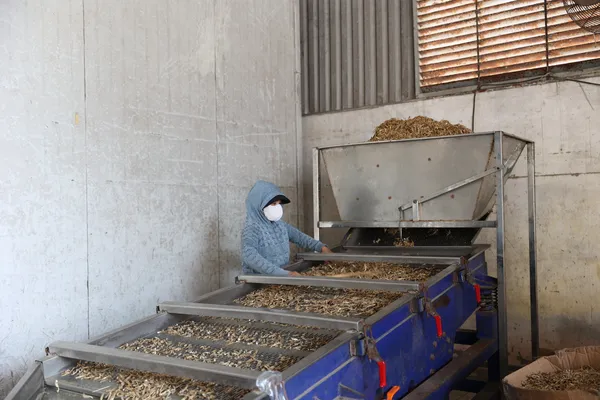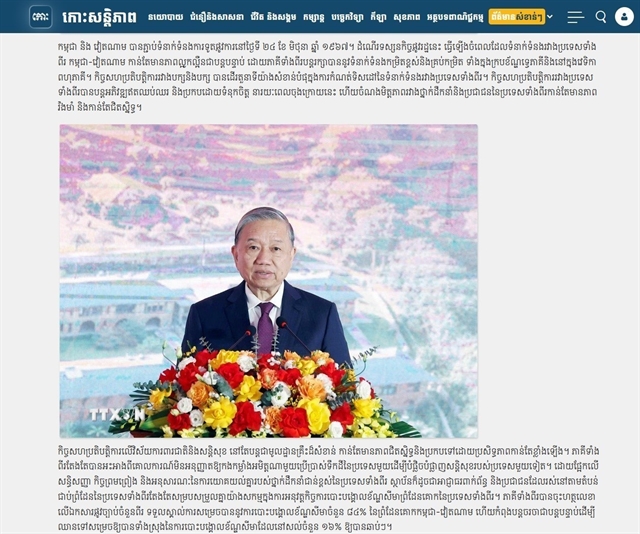 Politics & Law
Politics & Law

National Assembly Chairwoman Nguyễn Thị Kim Ngân has affirmed Việt Nam’s commitments to building a more friendly investment and business environment for enterprises, on par with global standards and those of the Organisation for Economic Co-operation and Development (OECD), of which Turkey is a founding member.
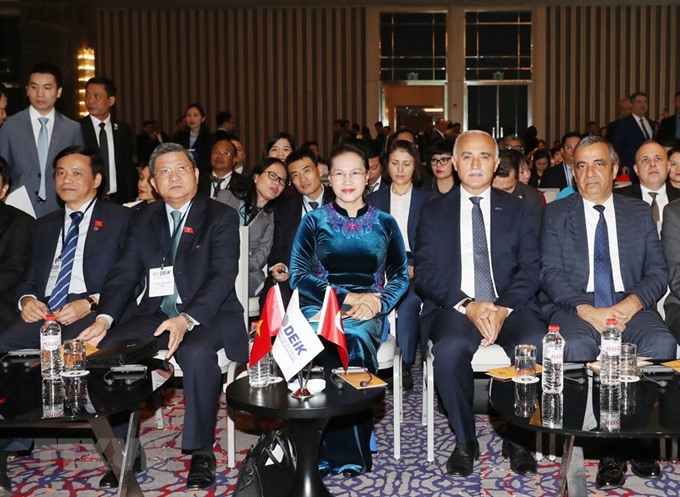 |
| National Assembly Chairwoman Nguyễn Thị Kim Ngân (centre) the Turkey-Việt Nam Business and Investment Forum in Istanbul, Turkey yesterday. — VNA/VNS Photo Trọng Đức |
ISTANBUL — National Assembly Chairwoman Nguyễn Thị Kim Ngân has affirmed Việt Nam’s commitment to building a more friendly investment and business environment for enterprises, on par with global standards and those of the Organisation for Economic Co-operation and Development (OECD).
Addressing the Turkey-Việt Nam Business and Investment Forum in Istanbul, Turkey yesterday – which drew about 200 Turkish and Vietnamese firms – the top legislator said that after the past three decade of reform, Việt Nam had maintained good growth and become a middle-income country.
She noted Việt Nam’s GDP had reached US$240.5 billion, with trade value of more than $475 billion and a population of 95 million.
Việt Nam’s investment and business environment had improved, she said, citing the World Economic Forum’s competitiveness ranking in 2017 in which Việt Nam jumped five places to 55th of 137 countries. Việt Nam also leaped 14 spots on the World Bank’s Doing Business Report in 2016 to 68th position out of 190 economies.
Việt Nam was becoming a production hub for many international firms in the region thanks to the country’s attractive policies and the friendly investment environment, stated the NA leader.
She briefed participants on Việt Nam’s international integration, including its network of new generation free trade agreements (FTA) that were paving the way for greater co-operation and development.
Việt Nam is an open economy with a two-way trade scale of $475 billion, nearly two times higher than its GDP, she said, adding the country has trade partnerships with 200 countries and territories, is home to 26 types of goods with export revenue exceeding more than $1 billion each and has potential for better engagement in global supply chains.
The NA leader said as a responsible member of the World Trade Organisation (WTO), Việt Nam had strengthened international integration.
Along with 10 signed and implemented FTAs, the Việt Nam-EU FTA and the Comprehensive and Progressive Agreement for Trans-Pacific Partnership (CPTPP) will be ratified in the near future, bringing preferential policies for a large market of nearly 40 developed countries. Việt Nam has also engaged in the Regional Comprehensive Economic Partnership.
To become a modern industrial country, Việt Nam hopes to maintain a GDP growth of 6.5-7 per cent per year until 2020, with GDP scale reaching $320-350 billion and trade value of $600 billion, said NA Chairwoman Ngân.
Regarding the Việt Nam-Turkey economic and trade partnership, she said since the two countries set up trade ties in August 1997, their partnership had thrived.
From only several hundreds of thousands of US dollars in the 1990s, two-way trade reached $2 billion in 2017. In the Middle-East, Turkey is the biggest non-oil partner of Việt Nam.
By the end of August 2018, Turkish investors had 18 projects in Việt Nam with combined investment of $708.2 million, ranking 26th out of 126 countries and territories investing in Việt Nam.
However, the NA leader said the figures had yet to meet the potential and expectations of both sides, stressing her hope they would seek measures to optimise the strengths of each country.
Ngân said she hoped the business communities of Việt Nam and Turkey would bring new ideas and renewed motivation in trade and investment partnerships, contributing to reinforcing and diversifying ties between the two countries and peoples.
“Việt Nam will continue to keep its door wide open for Turkish enterprises seeking co-operation, business and investment opportunities,” she declared.
Meanwhile, Chairman of the Turkey-Việt Nam Business Council Ali Tezolmez said the forum was a good chance for Turkish investors to grasp investment and business opportunities in Việt Nam.
Head of Turkey’s Foreign Economic Relations Board Nail Olpak said both Việt Nam and Turkey were facing challenges due to trade wars, requiring businesses of both sides to foster collaboration and make full use of business opportunities.
He said trade diplomacy and trade liberalisation hold great power as foundations for the growth of business partnerships, adding that Việt Nam-Turkey business affiliations should be based on these regulations.
Turkish trade ties
On the same day, President of the Foreign Economic Relations Board of Turkey (DEIK) Nail Olpak welcomed NA Chairwoman Ngân to the country to attend the Turkey-Việt Nam Business and Investment Forum during a meeting in Istanbul.
Olpak said that a delegation of Turkish enterprises would arrive in Việt Nam to attend a week of fashion and cuisine in late October.
Introducing the DEIK’s mission, Olpak said the board was established in 1985 to monitor the 144 Turkish business councils worldwide. In Asia-Pacific alone, it has nine business councils in charge of co-ordinating Turkey’s global business operations and holding responsibility for foreign economic-trade delegations working in the country.
NA Chairwoman Ngân expressed her delight at the development of trade and investment ties between the two countries, especially since the signing of the trade, economic and technical co-operation agreement in 1997.
She thanked Olpak and the DEIK for working with Vietnamese agencies to hold the forum, adding that direct flights between Việt Nam and Turkey had facilitated bilateral trade, investment and tourism.
The top legislator said the forum affords Vietnamese and Turkish firms a chance to learn about business opportunities in each side. — VNS

